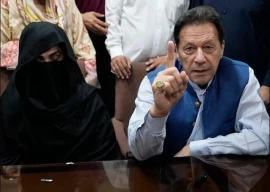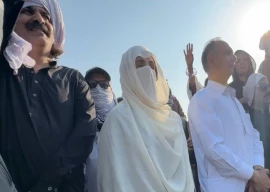
Three of his brothers, Abdul Majid, Abdul Basit and Abdul Saboor, were among the 11 men charged with involvement in the attack on Pakistan Army’s General Headquarters in October 2009 and the one on the ISI’s Hamza Camp. After their acquittal and subsequent release from Adiala Jail in May 2010, the prisoners were picked up by intelligence agencies – which later conceded that the ‘missing men’ were in their custody after the matter went to court.
At a recent hearing at the Supreme Court, the counsel appearing on behalf of the Inter-Services Intelligence and the Military Intelligence told the court that some of the missing persons were being treated in the hospital. The SC then directed authorities concerned to arrange a meeting between the men and their families.
And so it would happen. The brothers were in one room after three years. But in the presence of a security official there was little that could be said.
Abdul Baais said two of his brothers were in a “ghastly” condition and were being treated at the plastic surgery unit of the Lady Reading Hospital (LRH). “The torture has made them so weak that it was difficult to identify them,” he said. Abdul Majid had an urination pipe attached to his body and Abdul Basit’s legs looked as if they had been infected by polio, he added.
There was a third brother, Abdul Saboor – but he was not present in the room. His body had been found by a roadside in Peshawar days before the meeting. “It was a difficult moment. We were at a loss of words,” Abdul Baais said.
But it was Saboor’s death that was perhaps the catalyst that allowed the reunion.
After Abdul Saboor’s death, in an appeal to the Supreme Court, their mother, Rohifa, said that intelligence agencies should be ordered to immediately kill her sons and hand over their bodies to her if the superior courts could not provide relief to ordinary citizens. The petition challenged the trial of the previously ‘missing men’ under the Army Act.
Abdul Saboor, 29, is the fourth civilian detained in the case to have died under mysterious circumstances over the past six months — Mohammad Aamir died on August 15 last year, Tahseen Ullah on December 17, and Said Arab on December 18.
“It took me around 24 hours to find where they were being kept at the hospital,” Abdul Baais said of the meeting that took place a few days ago following the Supreme Court’s orders. “They were blindfolded and made to wear a cap when they opened their eyes because they were not able to adjust to light. It’s probably because of long internments in dark spaces,” he added.
Two other men, identified as Dr Niaz and Gul Roze, are also being treated at the hospital, but a relative of Dr Niaz, when approached by The Express Tribune, refused to discuss the matter.
Abdul Baais claimed that three other men, identified as Shafiqur Rehman, Mohammad Shafiq and Mazhar, were in custody somewhere in Parachinar, Kurram Agency.
The short but overwhelming meeting has given Abdul Baais some hope that his brothers might be released. “There is some hope that they will be released, but you can never be sure about their (spy agencies’) intentions.”
Published in The Express Tribune, February 4th, 2012.
COMMENTS (11)
Comments are moderated and generally will be posted if they are on-topic and not abusive.
For more information, please see our Comments FAQ

















Detainees coming out of Guantanamo Bay have been in much better shape than these men. Torture is a problem and not a solution. Why are these terrorists not tried in military courts if civilian courts are not providing justice? They should be jailed, or even hanged if proven guilty but not tortured. If the ISI has enough evidence against them to kidnap and torture then why are they not brining it out in a civil or military court? Who are they trying to protect by hiding the facts? I do agree with those who do not trust our judiciary. The history of our judiciary is to support powerful extremists and undo the election results.
Really sad
In this extreme torture, anybody can even admit 9/11 ... Where are we?? in Barbaristan??
Lets not protect the culprits and let the agencies do what is right. No human rights law or court is above the sovereignty of Pakistan. Where were their parents when their sons were targeting the GHQ and other military installations. The mother of these detainees shall remember the tears of shuhadaas family who sacrificed their present for Pakistan. Our weak justice system will never punish such people. Let the agencies punish them.
Same Behavior with innocent Baloch........... Where is the Pakistani Media???
@Umer: If they were criminals why wasen't the agencies able to prove that to the court? They were released for being innocent when spy agency took them away. If the agencies know everything why can't they prove anything? By force taking away someone and them killing them is not due process of the law.
Though I resent the military's role in politics and kidnapping journalists, these terrorists must be kept in check and I fully support the ISI on this. Surely, they should be answerable to the courts. What is sad here, is that the parliament is not doing its job: enacting laws; laws that are needed to make prosecution of Alqaeda inspired terrorists easier. Our law system is broken and old, the intelligence agencies cannot work with this system and they are forced to keep people in illegal confinement. What else are they supposed to do??
One thing people should keep in mind is that why would ISI or MI pick up "Innocent" people from the crowd and torture them? Are they mad? No, indeed, these guys were involved in Terrorism against our Country and they deserve it. Human Rights stuff is not for these animals who have butchered our brothers in the streets of Pakistan.
I think General Kiani and General Pasha should be tried for all this torture and murder, these generals are the most corrupt and evil people in our country!